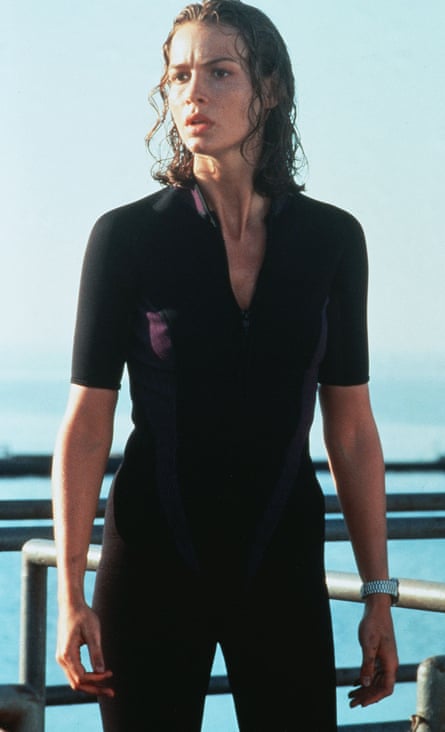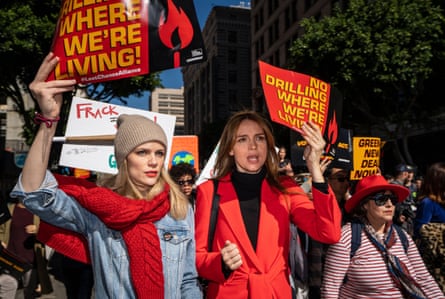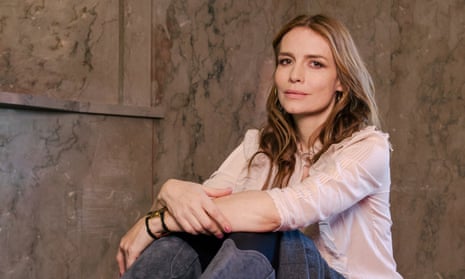When Saffron Burrows became an actor, there were scripts she had to throw straight out. Her prospective characters “were always running for their life in high heels”, she says. “If I read that on page five, I would stop reading. I’d get to a sentence or character description and just think: ‘Who are these people?’”
She made her name in the classic 1990s films Circle of Friends and In the Name of the Father, going on to blockbusters such as Deep Blue Sea and Troy, before starring more recently in the TV shows Mozart in the Jungle and You. She is proud of the roles that define her career. But even prouder of those she turned down. “Oh my God, yes!” she shudders. “Some very successful sexist films they’re now making the third sequel of.”
We meet at her favourite theatre in Los Angeles, the Wallis Annenberg Centre for Performing Arts. Burrows is 6ft tall and softly spoken, waving enthusiastically when she spots me walk in. Her latest project is the Lorien Haines play Everything I Ever Wanted to Tell My Daughter About Men, which traces one woman’s relationship history, exploring the impact of sexual assault, addiction and teenage pregnancy. She is starring in a one-night-only staged reading of the play in London on 20 February to raise money for survivors of sexual violence.
Harvey Weinstein’s trial is under way when we meet. The only time Burrows crossed paths with him was when she was already an established name – his company distributed the 2002 film Frida, in which she starred alongside Salma Hayek. The situation in the industry now, she says, is “pretty dark. A lot of people I know are still questioning what they knew and what they could have done sooner. And the few people I know who did try to do something sooner feel like their careers were destroyed because of it, so it’s still a very live subject. It’s certainly not resolved.
“And that’s just one person – I mean, there was a culture,” she says. “If someone was very powerful, most of their actions weren’t questioned. The fact that some companies are now having transparency in their pay structures is revolutionary. It shouldn’t be, but it feels revolutionary if you’ve come from an era where it wasn’t like that.”

Did she ever fear, early in her career, being manoeuvred into a casting couch situation?
“There were people you knew that, if you’re going to sit with that person and read a script, don’t go late in the day. You’d try to get an appointment early in the morning. It was so pervasive. Those people were in charge and that’s how they ran things.”
In an industry full of actors turned activists, Burrows is unusual for having been an activist first. Now 47, she says she became a feminist aged 10, and fell in love with community activism at that age, too, which made her “more strident about who I was as a person and how I felt about things; what I would and wouldn’t do”.
Her parents separated when she was young, raising Burrows between them in north London. They were active members of the Socialist Workers party, which formed the Anti-Nazi League in 1977. When the league disbanded in 1981, the family’s attention turned to local anti-racist groups. Burrows’ mother was a teacher, who worked at “pretty much every primary school in Hackney” over the course of 45 years, giving her a “certain degree of authority in the community”, she says.
“Kids would trust my mum, so they’d come into school and tell her about their houses being attacked and she’d try to do something to make the situation better. At the time, with the institutionalised racism in the police force, nothing was ever done, so it really was down to the local people.”
Burrows spent much of her early teens rounding up fellow school pupils for anti-racist, anti-fascist meetings that she sometimes chaired herself. Children from local Bengali families were being attacked on their way home from school, so one of their initiatives was to provide them with a safe place to play. At night, she and her boyfriend would go out spray-painting over fascist graffiti.
She also began organising for disability rights. Her stepfather Richard Rieser used crutches after contracting polio as a baby; he set up Disability History Month 10 years ago, and campaigns for the inclusion of disabled children in mainstream schools. “As a seven-year-old, I remember people were appalling – they would just comment on his physicality,” says Burrows. “We’d walk down the street together and people would shout out insults. I remember feeling incredibly angry.”
I’m surprised Burrows opted to become an actor. Wouldn’t she have been more suited to politics? “I wanted to be an MP very much,” she says. “I do have a penchant for the bureaucracy of union conferences, motions and speeches. Certainly there’s a huge amount of nitty-gritty that some people would find tedious but I might enjoy.”
Instead of going into politics, Burrows began her career at 15, working as a model. She went to Paris, living with other young girls, who “were not earning a fortune”, she says. “They were earning, sometimes, very little, and sending the money home to their families. Or they’d been abused and they were fleeing violence. I must have lived with 75 girls. Some people would come for a year, some for three days, then you’d never see them again.”

She has been writing a script based on that experience, “about what took place in the Paris fashion industry, and the oppression of mostly working-class girls from all over the world.”
She says writing “just started to pour out” of her when working for six months at a time on films such as Troy. “Writing was a brilliant discovery. It gave me an outlet that was not about other people’s schedules or time. I found it the most wonderful way of not feeling impotent at work and stuck.”
Burrows has been supporting the One Fair Wage campaign, run by Saru Jayaraman; women who have been oppressed by customers or their bosses are encouraged to share stories of working for tips in restaurants. The way Jayaraman explains it, says Burrows, is: “If one of your first jobs as a young woman is in the tipping industry and you’re told by your boss to pull your zip down and pull your skirt up to survive, then you start at such a low bar of expectation that, thereafter, nothing fazes you.”
And that, says Burrows, is exactly what has happened in the film and fashion industries, where women typically start out very young. “If you’re told that’s how you behave in order to survive and flourish, then you actually question far less in your 20s and 30s because you think: ‘Oh, nothing’s as bad as that.’ So it’s a real issue. No one wants their teenage daughter thinking that’s what you should expect from your life.”
Burrows has two children with her wife, the TV writer Alison Balian, from whom she recently separated: a seven-year-old son and a three-year-old daughter. Given the title of the play she’s appearing in, what would she want to tell her children about men? The play’s title, she says, is not to be taken so literally.
“I was concerned it could be perceived as something anti-men, and that’s absolutely not the point. Lorien is very funny and wrote it with some irony in the title.”
Does she think it’s possible for us to prepare our children for what lies ahead in such serious times – were her own parents able to prepare her? “My mum talked to me about justice, racism, homophobia, sexism and misogyny. She would never just say: ‘Don’t say that word because it’s racist.’ She’d explain why the word led to not just verbal but physical violence.
“Now I have young children I think: ‘Oh, that’s the way to talk to them.’ You don’t just give them a pat answer to things, because it doesn’t make sense to them. They have to know why something’s not OK. I try to speak to my kids how my mum did, which is respecting them as human beings and giving them as full an answer as you can, that still allows them to have a childhood and feel safe. So they’re aware of Greenpeace and they know what the civil rights movement is. Well, my seven-year-old does – my three-year-old not so much, yet.”
The play has inspired a feature film – an amalgamation of 24 short films, all directed by women, including Burrows and fellow actors Tara Fitzgerald and Sienna Guillory.
“I audaciously asked Lorien: ‘Have you got any left or have you shot them all?’ And she said: ‘There’s a few left, would you like to do one?’ I’ve been wanting to direct for a long time.”
Burrows’ career has shifted from film into TV in recent years, most notably with a starring role in four seasons of the Amazon comedy drama Mozart in the Jungle (2014-18). Was it a conscious decision to move into TV roles? “I’d like to say that yes, I had a plan, but it was much more the things that were interesting that came along,” she says. “You want to tell certain stories and the size of screen is less relevant.”

This spring, Burrows will begin filming another season of You for Netflix. The thriller goes inside the mind of Joe Goldman, a seductive serial killer and stalker played by Gossip Girl’s Penn Badgley. Burrows portrays the bohemian mother of Joe’s latest obsession, Love Quinn (Victoria Pedretti). “It’s clever,” she says. “It reminds me of The Talented Mr Ripley. His intelligence and softness and gentle frame: ‘Why am I liking this person?’”
Some have questioned its perspective and politics; Badgley himself has spoken about his concern that female viewers have been lusting after his character. When I ask Burrows about this, she points out that she only worked with female writers and directors on the episodes she has made, and found the filming interesting. “You’re telling this rather twisted story with these kids – these actors – who have feminist mothers. The cast are incredibly politically awake.” But with the still-rising popularity of true-crime dramas and podcasts, isn’t it time we gave stories about female victims a rest?
“There was a period where every time you turned on the telly there was a corpse at the beginning of anything. I find that very offensive,” she says, rolling her eyes. “I think it’s got a little better now. They’re trying to look like they’re not just putting women in bikinis.”
Her writing has been a fantastic antidote to the ageism in the acting industry, she says, to the feeling that “you’re getting stuck at a certain age or categorisation, or feeling disempowered because, ultimately, as an actor, you are being chosen by others, unless you create your own work”. She is also glad to have left behind the days when her relationships with men (including Alan Cumming) and women (including Fiona Shaw) sometimes overshadowed her work. “I remember doing interviews in my 30s and there was a lascivious element to the questioning that was incredibly categorising and reductive. I stopped doing interviews for a while because of that.”
She was moved by Phillip Schofield’s recent announcement, aged 57, that he was gay. “I was sad he’d had to hold on to that for so many years, but it was beautiful how people embraced him,” she says. “Teenagers today are so fluid and non-binary; they’re fantastically unafraid. My house [growing up] was a bit like that. I’ve loved men and I’ve loved women and I was raised to feel like I could love who I wanted. We could talk about everything in the world.”
Everything I Ever Wanted to Tell My Daughter About Men is at The Sam Wanamaker Playhouse on Thursday 20 February at 8pm
